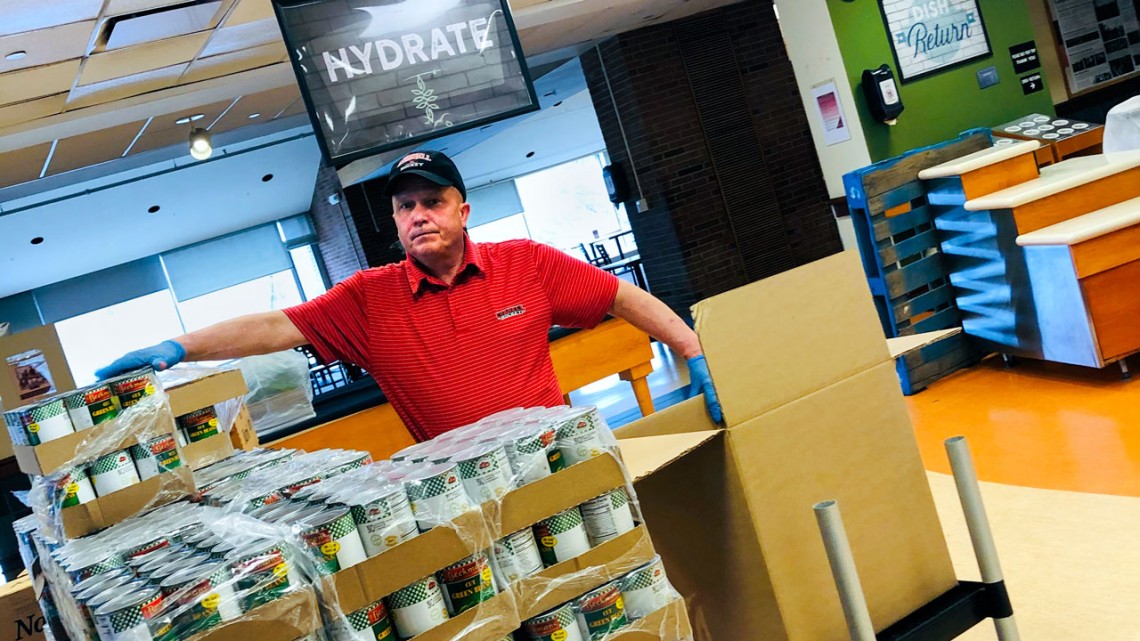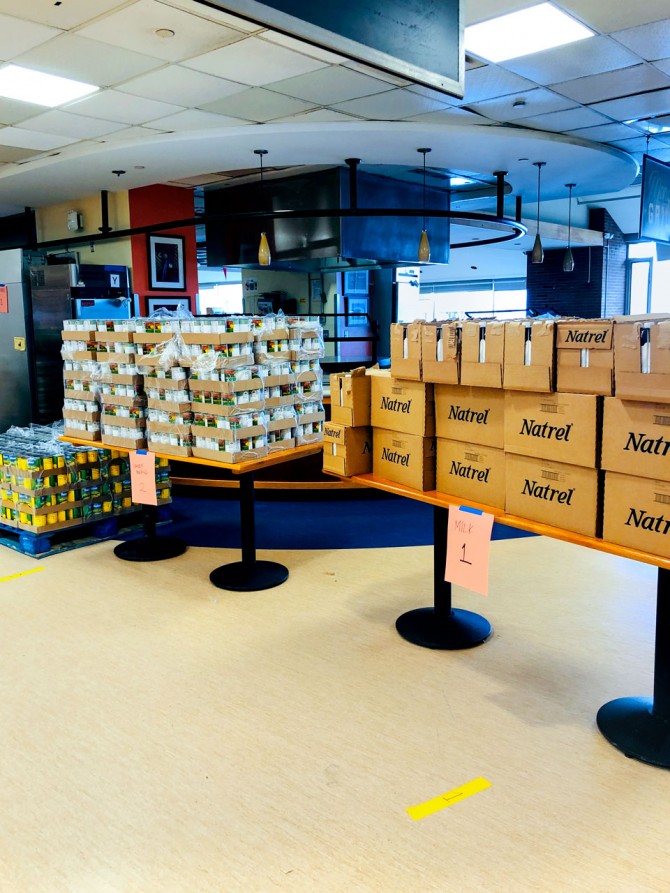
Tommy LaLonde, a cook at Robert Purcell Marketplace Eatery, boxes up food donations.
Partnership feeds area families amid coronavirus woes
By David Nutt
The coronavirus pandemic has had an obvious impact on families, schools, businesses and health care providers. Less obvious, perhaps, is how it has affected community volunteers and the organizations they serve.
Many volunteers are elderly and have been sidelined by the virus, putting a strain on several food pantries in the region. As a result, approximately 800 households per month may lose food pantry services in Tompkins County.
To provide immediate local relief, Cornell has partnered with the Food Bank of the Southern Tier and the Greater Ithaca Activities Center (GIAC) to collect and distribute much-needed meals for food-insecure families.
The effort officially launches March 31 from 1-4 p.m. at GIAC and will continue every Tuesday and Thursday during those hours.
“It’s more challenging for families to access food right now, especially families who are low income and usually use the emergency food system, such as pantries and meal sites,” said Amanda Palme, programs and partnerships manager for the Food Bank of the Southern Tier. “With schools being closed, children are home, and a lot of families rely on schools to feed their children at least twice a day. And many people have found themselves out of work.
“There’s a heightened anxiety that people feel,” she said. “You’re already fearful of getting sick. And now you’re afraid of getting sick and also not being able to feed your family.”
The university previously established a partnership with the food bank through the Cornell Food Pantry, an initiative serving the university community – run by Cornell Dining, within Student and Campus Life – that launched in October 2019.
Like other food pantries in the region, Cornell Dining places weekly orders with the food bank to stock the campus pantry. Now, it is placing much larger orders – 15,000 to 17,000 pounds of food per order, up from 2,000 to 3,000 pounds – that are shipped to Robert Purcell Community Center, where Cornell Dining staff offload and repack perishable and nonperishable food items. University staff will distribute these meals at the basketball court at GIAC in downtown Ithaca.
The organizers plan to provide food packages – each containing a three-day supply for a family of four – to 200 families on Tuesday, and another 200 on Thursday.
The packages include cereal, potatoes, canned soup, boxed macaroni and cheese, orange juice and rice, as well as cold items such as frozen chicken patties, frozen peaches and shelf-stable milk.
“We are advising all of our pantries to pre-box and pre-bag everything, because of the need for social distancing,” Palme said. “Cornell has the staff base and resources to pre-box everything and they have the trucks to transport it to the distribution site. They’re doing a lot of boots-on-the-ground work in Ithaca, making sure that food is getting to the people that need it. That is a help.”
In recent weeks, there has been a surge in outreach efforts by the Cornell community to help those who are struggling during the pandemic:
- Research labs are donating essential medical supplies;
- Community members are sewing surgical masks for Cayuga Medical Center in Bartels Hall;
- Members of the Cornell women’s hockey team helped Foodnet Meals on Wheels prepare 14-day “go bags” for seniors in the event of service disruptions related to coronavirus; and
- Cornell Dairy delivered more than 4,000 units of chocolate milk and several pounds of cheese curds to Friendship Donations Network, which disbursed the items to the YMCA, Loaves and Fishes, and other local organizations.
“People feel so out of control in so many ways,” said Mark Miller, Cornell Dining manager in Student and Campus Life. “They want something they can control and help with. Especially for people who remain on campus, our staff, this really gives them a meaningful way to be involved and feel like they’re making a difference.”
While Cornell Dining does not have the capacity to accept one-time food donations, Miller said people who want to lend their support can contribute via a fundraising link. The Cornell Food Pantry – which is staff-run and serves anyone who is a faculty or staff member or student – has remained open during the pandemic, and Cornell Dining continues to provide meals to students who are self-isolated, on or off campus.
Not only does Cornell have the means of prepacking, transporting and distributing food, Palme said, the university also has the willingness and enthusiasm to support the community and give back.
“Cornell has been a wonderful partner of ours. They reached out to us and asked what they could do. That’s very telling of where their heart is at,” Palme said. “They truly believe in the community of Ithaca and the people who live there. I was so inspired when I got the call and they asked how they could help.”
Miller in turn praised the Food Bank of the Southern Tier and GIAC for their years of service to the region and their partnership.
“These connections were already there, but this is making those connections even stronger to help those who need it the most,” Miller said. “People need to eat. So we’ll be there as long as we need to be.”
Media Contact
Get Cornell news delivered right to your inbox.
Subscribe


